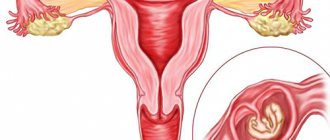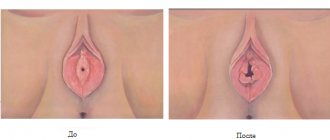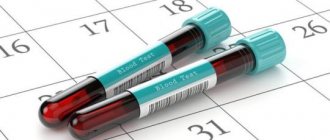What to do if this happens?
To return the cycle and stop the development of amenorrhea, it is necessary that the fat layer in the body is about 20%. Gradually increasing your daily caloric intake, you need to gain weight to a safe level.
First of all, you need to see a doctor. Only a gynecologist will be able to assess the severity of the situation and take appropriate measures. Do not ignore your doctor's advice.
If you exercise to the point of exhaustion, reduce the load. Of course, sport is good for health, but you need to know when to stop. Replace heavy workouts with yoga, stretching or swimming.
Review your diet, pay more attention to nutrition. Recovery is a long period. There should be 5-6 meals a day. Eat more often, but in small portions. This way, metabolic processes will work faster. Give preference to quality products. The approximate percentage ratio of BZHU should look like this:
- carbohydrates 40-50%;
- proteins 30-40%;
- fats 20-25%.
How to get your period back after anorexia. Amenorrhea due to weight loss, diagnosis, treatment
Amenorrhea after weight loss often happens if a woman is too keen on a cosmetic diet. This type of amenorrhea refers to functional hypothalamic-pituitary disorders. Adipose tissue has the function of producing and exchanging sex hormones. Surgical loss of 15 percent of fat leads to the formation of the disease. Amenorrhea due to weight loss is caused by a high level of leptin in the blood, a protein that is formed in adipocytes and controls appetite. In addition to diet, patients take anorectic or diuretic medications. Women are very reluctant to admit to using enemas. They often cause vomiting and enormous stress with a negative potential effect.
Clinical symptoms and signs
Patients do not immediately admit to the doctor that they are starving in order to be beautiful. Most women are not able to continue a strict diet, but some have a strong will, study excellently, and strive to be leaders. If weight is lost for quite a long time, serious health problems appear: hypothermia, hypotension, hypoglycemia, bradycardia. If family members try to interfere, the woman resists.
Such a conflict situation leads to family conflicts, aggression, insomnia and depression. Subsequently, an aversion to food appears, and severe vomiting occurs after eating. If a woman continues to lose weight, her mental state worsens and a dangerous disease develops - anorexia nervosa. This disease is mental - the patient is no longer able to eat, she continues to lose weight, and other symptoms of extreme starvation appear.
Diagnostics
Diagnostic symptoms of amenorrhea due to weight loss:
- At the same time, amenorrhea and weight loss occur.
- Lack of weight against the background of dry skin, losing the density of the mammary glands.
- The content of estradiol, FSH, and LH in the blood decreases.
- Ultrasound examination shows a decrease in the size of the uterus.
- At the same time, studies confirm that the size of the ovaries is within normal limits, and the follicular apparatus is also in normal condition.
Amenorrhea due to weight loss: treatment
If amenorrhea occurs after losing weight, its treatment consists of normalizing the nutritional regimen.
- Complete nutrition in the amount of 2,000-2,000 kcal/day.
- Vitamins B, C and E.
- If no effect is observed, combination therapy is carried out for two to three months.
- To assess the effectiveness of treatment, the patient is observed for some time after the course. Treatment is considered successful if the menstrual cycle is maintained.
- For anorexia, psychiatric treatment is provided.
All medications should be taken only after being prescribed by the attending physician. The treatment prognosis is favorable.
How to gain weight with amenorrhea
The best way to gain weight and return to a normal, regular cycle is to eat more fat and starch. Eating saturated fats is especially beneficial because they are the basis for the production of hormones and are found in: beef, poultry, pork, dairy products, lard, chocolate, cold-pressed coconut oil. The amount of carbohydrates is also important. A day, you need at least one piece of fruit or a serving of starchy carbohydrates with each meal.
Amenorrhea in adolescents
cIrregularities in menstruation are observed in 62% of cases in teenage girls.
This is facilitated by the immaturity of the reproductive system and the presence of unfavorable factors at the time of the formation of new body functions. In cases with adolescents, psychosocial aspects are of great importance. Particular attention should be paid to secondary amenorrhea in teenage girls. The diagnosis is established if menstruation is absent for at least six months (if this is not associated with pregnancy and lactation). A doctor is often consulted for primary amenorrhea. Parents consider the secondary form of amenorrhea a threat only if there has been no menstruation for more than a year. It is important to seek medical help promptly to avoid infertility and other dangerous complications.
What should you include in your daily diet?
- Fats. They are the ones responsible for women’s health and the well-coordinated functioning of the ovaries. This could be: flaxseed oil, vegetable oils, nuts, seeds, red fish, high-fat dairy products, avocados. Additionally, you can take Omega-3 in capsules.
- Sufficient amount of clean water.
- Meat. Beef, chicken, lean pork.
- Vegetables and fruits. Pomegranates, bananas, and beets will be especially useful.
- Greenery. Parsley, dill, lettuce, basil.
Menstruation
Can I miss my periods due to diet? Due to the presence of regular critical days, the proper functioning of the ovaries, which perform not only the generative, but also the endocrine function of the female body, depends. Frequent delays in menstruation or its absence at all pose an extreme danger to the body.
Most often, this problem is faced by girls who have decided that they need to lose weight as soon as possible. Strict dietary restrictions with a serious reduction in daily caloric intake can become an impetus for disruption of hormonal levels and female reproductive functions.
Folk remedies
Herbal medicines will help bring back your critical days. Our ancestors have long used them to treat many diseases. Here are a couple of remedies from the treasury of folk wisdom.
- Flax seeds. 1-2 tablespoons should be taken on an empty stomach with a glass of water.
- A decoction of mint leaves. Helps restore hormonal levels and reduce the amount of male hormones. A decoction is prepared from 1 tablespoon of dry leaves and 1-2 cups of boiling water. Leave for about half an hour.
- A decoction of wormwood can also help. For a liter of boiling water – 2 tablespoons of dry herbs. After this, you need to boil the broth in a water bath for another 15 minutes. Take two spoons before meals.
Of course, traditional medicine will not help cure diseases that could cause the cessation of critical days. Therefore, before drinking anything, you need to consult a gynecologist about symptoms, treatment and additional use of medicinal herbs.
ONLINE REGISTRATION at the DIANA clinic
You can sign up by calling the toll-free phone number 8-800-707-15-60 or filling out the contact form. In this case, we will contact you ourselves.
If you find an error, please select a piece of text and press Ctrl+Enter
Why do periods disappear when you lose weight suddenly?
Diets radically change life and this concerns not only the desired external transformation. Prolonged fasting depletes the body. For this reason, women diagnosed with anorexia do not have periods at all. During puberty, parents should warn their daughters in advance about the dangers of this condition. According to statistics, it is young girls who more often suffer from eating disorders and psychological behavior, which leads to severe food restrictions and the subsequent absence of menstruation after dieting.
Trying to lose weight in any way, many do not control their diet and exercise. As a result, the female body, sensitive to change, experiences severe stress. Menstruation disappears completely or becomes scanty.
Before looking for ways to restore the stability and regularity of menstruation, you need to find the reason for the absence of critical days after losing weight. It could be:
- deficiency of vitamins and beneficial microorganisms;
- lack of calories;
- metabolic disorders;
- hormonal disbalance.
Adults and growing women who abuse fasting and intense exercise should understand how important fat tissue is for the body.
They are the ones who participate in the exchange and absorption of hormones. Fat deficiency negatively affects the regulation of the menstrual cycle. When you lose weight, your periods disappear and become unstable and often painful. This causes disturbances in the functioning of the endocrine and digestive systems, as well as all reproductive processes. The liver and heart suffer. Uterine bleeding, the formation of polyps in the uterus and fibroids are possible. There is a possibility of developing cysts, tumors and infertility.
It will take a lot of time for teenagers and adults to regain their periods after losing weight, especially if serious pathologies are diagnosed. If no diseases are detected and pregnancy is not confirmed, to normalize the cycle it is enough to review the daily routine, nutrition and physical activity.
What does this mean?
Not only the complete absence of menstruation, but also inconsistent (or scanty) discharge can lead to very serious problems in the field of women's health. It’s hard to believe, but it is a strict diet that often becomes the cause of the development of diseases that lead to infertility. Amenorrhea also threatens with such ailments as:
- Uterine bleeding (very dangerous, many negative consequences for the whole body!),
- Inflammation,
- Cyst formation,
- Endometriosis,
- Formation of fibroids, myomas and polyps,
- The appearance of malignant neoplasms.
If signs of the diseases described above have already appeared, you should definitely go to a gynecologist. You cannot delay it - this can lead to significant complications.
Symptoms
Irregularities in the menstrual cycle can manifest themselves in different ways:
p, blockquote 7,0,0,0,0 –>
- algomenorrhea - severe pain in the lower abdomen, although there was none before losing weight;
- amenorrhea, when there are no periods at all in the absence of pregnancy;
- hypermenorrhea - they have become too abundant;
- hypomenorrhea - menstruation has become scanty: thick dark brown discharge on the days of menstruation just “smears”, but there is no bleeding as such;
- dysmenorrhea - they are accompanied by headaches, pressure surges, nausea, complete loss of appetite;
- oligomenorrhea - may end within 1 day;
- opsomenorea - a long delay when menstruation does not come for several days, or even weeks;
- polymenorrhea - takes too long;
- promenorrhea - a decrease in the cycle by several days, that is, menstruation began to occur more often than before.
All these symptoms are deviations from the norm that cannot be ignored or left to chance. If timely measures are not taken, complications cannot be avoided. This may lead to:
p, blockquote 8,0,0,0,0 –>
- iron deficiency anemia;
- increased fatigue, general weakness;
- increased heart rate and tachycardia;
- hypotension;
- regular fainting;
- deterioration of the skin condition (wrinkles appear, it loses elasticity), nails (flaking), hair (falling out);
- decreased mental activity;
- moderate cognitive impairment.
However, the worst consequence of menstrual irregularities in women as a result of weight loss is infertility.
p, blockquote 9,0,0,0,0 –>
Prevention
It is not surprising that many doctors say that it is easier to prevent almost any problem or disease than to subsequently treat it correctly. Any gynecologist whom a woman would turn to will definitely say that a sharp decrease in body weight will lead to disruption of the menstrual cycle and lack of regularity.
If there is no other way to adjust your weight, then the only thing you can make an exception to is to follow a strict diet for several days in the middle of the cycle, but it should not continue beyond 10 days. Given this, many women wonder what to do if they need to get rid of extra pounds.
You can stick to the diet for no more than 10 days. Source: manexpert.ru
It is recommended that you work with a nutritionist to properly develop a weight loss program. It is important to understand that in order for excess weight to go away, you do not need to give up food, it just needs to be right. Also, a few days before the expected date of the onset of menstruation, you must adhere to the following tips:
- Any physical activity should be adjusted so that the body does not experience severe fatigue;
- The diet during menstruation should consist of 60% fresh fruits and vegetables;
- To avoid a deficiency of useful elements, the menu should contain foods containing iron, for example, it could be meat or liver;
- The amount of clean liquid consumed should be at least 2 liters per day;
- It is necessary to replace completely low-fat products with those in which the content of this substance is reduced, but is still present.
As you can see, there is a way to lose weight, as well as get rid of extra pounds, without disturbing the stability of the menstrual cycle. You just need to monitor the completeness and correctness of your diet, perform moderate physical activity, spend more time in the fresh air and be in a good emotional state.
Calculate your weight norm
Women choose their own path to slimness and an ideal figure. Some people prefer to simply starve, others go for dangerous experiments. Regardless of the type and content, the essence of dietary nutrition does not change. Restricting food intake and avoiding fatty foods leads to a calorie deficit. Under such conditions, the body begins to defend itself and switches to saving mode. For reproductive health, fasting is dangerous because it disrupts metabolism and blocks ovarian function. The sex cells simply do not mature, and for this reason menstruation stops.
In order not to restore the menstrual cycle, those losing weight should monitor their weight and control losses. This will avoid hormonal imbalances and inevitable complications.
You can calculate your weight norm and focus on the data obtained. There are several formulas and techniques. The simplest and most understandable is the generally accepted body mass index, abbreviated BMI. It is calculated using the parameters of height in square meters (P) and weight in kilograms (B).
The formula looks like this: BMI = B (kg): (R m x R m).
It's easier to understand with an example. Let's say your weight is 60 kg, your height is 173 cm or 1.73 m.










